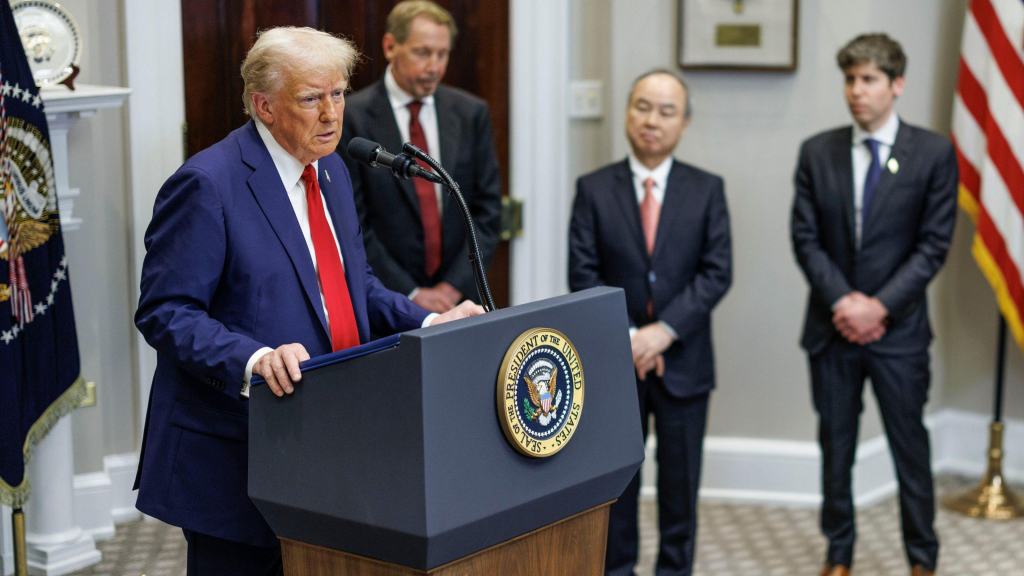Project Stargate Unveiled: A $500 Billion Initiative Developing AI Infrastructure In U.S. Over Four Years
On January 21, 2025, President Donald Trump announced the launch of Project Stargate, a $500 billion initiative aimed at bolstering America’s AI infrastructure. This announcement was made during a White House press conference, marking a significant moment in the nation’s technological advancement.
A staggering $500 billion was committed to fuel the nation’s artificial intelligence capabilities, marking what has been described as the most significant tech announcement since the advent of the internet. This investment is set to propel the U.S. into a new era of technological dominance, with key players like OpenAI, Oracle, and SoftBank leading the charge.

The Biggest Tech Announcement Since the Internet
The tech world was abuzz with excitement as details emerged of an unprecedented investment aimed at revolutionizing America’s AI landscape. This initiative, dubbed Project Stargate, was unveiled with the promise of reshaping the future of technology. Wall Street, however, seemed oblivious to the potential profit avenues this could open for various companies.
The Global AI Race Intensifies
The announcement came at a pivotal moment in the global AI race, where the U.S. and China have long been locked in a technological tug-of-war for supremacy. On this day, Project Stargate marked a new chapter, with a $500 billion commitment signaling a serious escalation in this competition. Beneath this headline-grabbing figure, something even more profound was brewing, hinting at transformative changes on the horizon.
Project Stargate: Beyond a Mere Tech Investment
Project Stargate isn’t just about pouring money into technology; it’s about constructing a colossal AI infrastructure across the United States. The initiative begins with the development of 10 advanced data centers in Texas, each designed to interconnect thousands of computing chips to manage vast data processing capabilities. This foundation is not merely about enhancing computational power but about laying the groundwork for next-generation AI applications with far-reaching implications.
A Consortium of Tech Titans
This project brings together some of the most influential entities in technology:
- OpenAI leads with its forefront position in AI development.
- Oracle brings its formidable cloud computing expertise to the table.
- SoftBank provides the deep financial backing necessary for such a venture.
Additionally, tech partners like Arm, Microsoft, and NVIDIA are integral to this ecosystem. However, the true narrative isn’t about the who but the what – the creation of a monumental AI infrastructure.
The Scale of Ambition
With an initial investment of $100 billion, Project Stargate is set to deploy the full $500 billion over the next four years. This phase-one investment alone is expected to create over 100,000 American jobs, distinguishing this project from any before it. The U.S. government’s full endorsement, including expedited energy production and emergency declarations, underscores the initiative’s critical role in maintaining America’s technological edge.
A Comparative Global View
While Europe grapples with its €1.5 billion AI Factories initiative, Project Stargate’s scale is over 300 times larger. This disparity in investment is poised to significantly alter the global AI landscape, with long-term implications that are staggering.
Leadership and Structure
SoftBank’s CEO Masayoshi Son will serve as the chairman of this venture, with OpenAI overseeing the operational aspects. Oracle’s role is to bring its cloud expertise to optimize the project’s infrastructure. Together, they’re not just building data centers; they’re cultivating an AI ecosystem with the potential to change the technological paradigm.
Beyond Infrastructure: Control of the Future
The implications of Project Stargate extend beyond mere infrastructure. It’s about who will steer the future of technology. One crucial aspect often overlooked is the role of specialized AI cloud providers in this new era. As AI demands soar, traditional cloud services fall short, akin to fueling a Formula 1 car with regular gasoline. Specialized providers are thus becoming indispensable, offering optimized solutions tailored for AI’s unique demands.